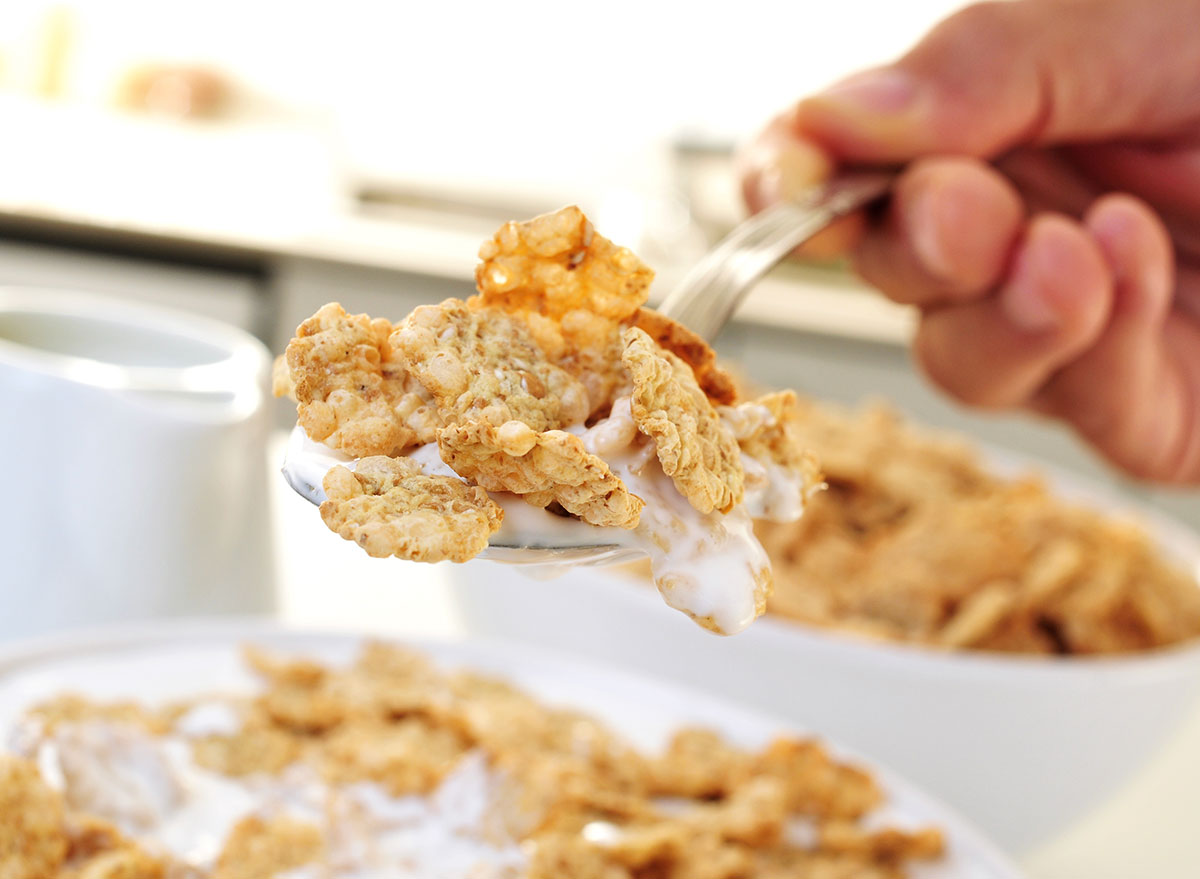The #1 Reason Why You Shouldn’t Eat Cereal

There’s a reason why grocery stores dedicate entire aisles to boxes of cereal. Cereal has become an American kitchen staple over the years, and a beloved breakfast item across the country. And while digging into a bowl of Frosted Flakes or Reese’s Puffs sounds like a delicious way to start your morning, we can’t help but point out the truth—cereal is full of added sugars. A simple serving of Frosted Flakes contains 12 grams of sugar, which is almost 50% of the average recommended intake of sugar, according to the American Heart Association (AHA).
And yet, while most beloved breakfast staples are full of sugar and refined carbohydrates, most sugary cereals don’t contain the two things that keep you feeling full after eating—protein and fiber.
Here’s why a lack of protein and fiber is the one reason you shouldn’t eat sugary cereals anymore, and for even more healthy tips, be sure to read up on our list of 100 Unhealthiest Foods on the Planet.
Why you need fiber and protein
Let’s look back at Frosted Flakes, shall we? If you were to take a look at the nutritional information on a box of Frosted Flakes, you would notice that the cereal has less than one gram of dietary fiber and only one gram of protein. Unless you’re eating your cereal with milk that has some fat in it (which contains some protein), your meal won’t be giving you a sufficient amount of fiber and protein that your body needs.
Here’s how it works: Fiber is a nutrient that is found in whole grains that helps with feeling full, digestion, gut health, and even weight loss. When a bread product is stripped of those natural whole grains, they lose the fiber content. Adults are recommended to get at least 25 to 30 grams of fiber a day, but currently the average American typically only consumes 10 to 15.
Plus, a bread product—like cereal—doesn’t contain a lot of protein as is, and protein is an essential macronutrient needed for keeping you full for a longer period of time.
If you’re indulging in a sugary cereal that lacks fiber and protein, we’re willing to bet you’ll feel hungry just a mere hour or so later. Admit it—are you guilty of eating bowl after bowl? Probably because your body still feels hungry, even if you’re eating a lot! Fiber and protein will fix that problem for you.
What if I love cereal?
If you really, really love cereal and can’t imagine giving it up, then why not find some solutions? Adding fiber and protein to your bowl will help significantly in making you feel full and satisfied for hours after your breakfast, while still eating a food you love.
Instead of merely eating a bowl of cereal with milk, what about sprinkling your cereal on top of a bowl of Greek yogurt? The yogurt brings in protein and healthy fat, both good for keeping you full. Add in some fresh raspberries for a boost in fiber and your breakfast just went from boring to brilliant!
Now if you prefer your cereal with milk, you could obviously follow the same model. Choose milk that has some fat in it (like 1% or 2%) for some protein, and still sprinkle in some berries. Even adding a hard-boiled egg on the side for some added protein will make all the difference.
Lastly, if you’re open to making some healthier swaps, try a cereal that’s higher in fiber and low in sugar. You’ll still get that satisfying crunch you crave in the morning, but without all of those added sugars slowing you down.
Again, if you like your cereal, keep in mind the added sugars. Portioning out your cereal is important, and keeping your sugar intake low the rest of the day is key. If you’re finding that cereal is not satisfying for you to eat, and you would rather your daily allotted sugar be used elsewhere, then ditch it entirely. Because you deserve to eat the foods you love, and not waste your time on foods you don’t really care for!
More Cereal Stories on Eat This, Not That!
- The Unhealthiest Cereals on the Planet
- This Healthy “Cereal” Trend Is Going Viral on TikTok
- One Major Side Effect of Eating Cereal Every Day
- What Happens to Your Body When Eating Breakfast Cereal, Says Science
- The Healthiest Breakfast Cereals on the Planet








